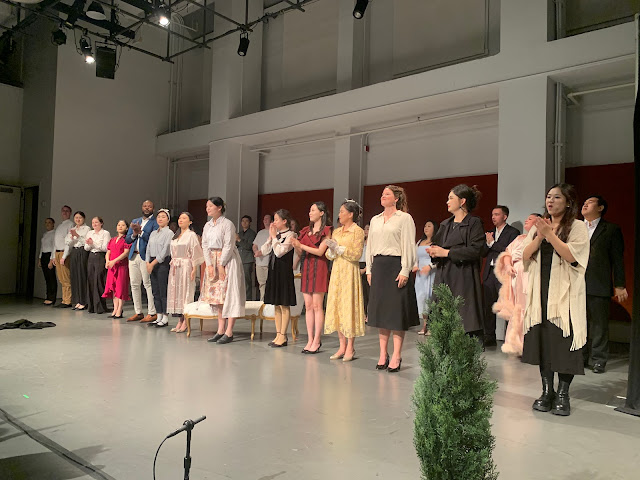Members of Manhattan School of Music Opera Theater
in Graduate Opera Scenes
We have lost count of the number of operas and opera scenes we have enjoyed at Manhattan School of Music. We have always gone home eager to share with you, our dear readers. What uncomfortable feelings we are having at the moment, reluctant to have anything negative to say. In no way do we have any negative criticism of the lovely young singers we heard Friday night. The negative feelings come from an egregiously directed program--feelings so strong that we will spare the director the embarrassment of being named.
This was one of those loathsome "concepts" designed to show off the so-called originality of the director, rather than the gifts of the singers. The "concept" was so murky as to require a lengthy Director's Note to explain and so unwieldy as to leave us baffled. Operas from different periods and different languages were forced into a Procrustean bed with heads and feet chopped off willy-nilly. (And maybe some willys chopped off as well. We laugh that we do not weep.)
What was this Procrustean bed? Everything was meant to take place in the 1950's; why this unattractive decade has been favored by recent directors is beyond us. Everything was meant to take place in the Waldorf Astoria Hotel. We kid you not. Perhaps the director was stealing from Neil Simon's Broadway play Plaza Suite. We have neither the time nor the inclination to share the director's posturing but we will mention that she claims to have made great use of her experience with "Method acting". Perhaps this was fun for the students but we have seen much more persuasive acting from MSM students under the directorship of Thomas Muraco and Dona Vaughn, among others.
A printed paper tried to justify the scene changes thusly--"In the bridal suite" and "In the alleyway" and "Down in the banquet hall". If one knew the opera and understood what was going on, the setting and the text made even less sense. Some scenes were announced by students and it is here that we saw (heard) room for improvement. Diction and enunciation were sloppy and delivery was rushed; explanations could not be understood. Strangely, a young woman gave a couple of these announcements in Mandarin and, although we are a rank beginner in the language, we caught more words from her than from the English speakers. Singers need to learn how to use their voice differently when speaking.
As to the singing, a few singers caught our attention and by singling them out we apologize for not mentioning others who were equally good. The problem was that it was difficult to focus on the singing whilst trying to figure out what was happening onstage.
Ladies first! Sara Nicole Stevens whom we recently reviewed elsewhere, gave a riveting performance in a truly horrible scene from a Missy Mazzoli opera that we would not sit through upon pain of death or imprisonment. It was impossible to comprehend what was going on.
Ziyi Zhang accepted the challenge of "Come scoglio" from Mozart's Cosi fan tutte. This notoriously difficult aria will be something to work on. Verdi's music is considered beyond the grasp of young singers but given the small size of the Ades Performing Space, Brooke Romaine employed a large instrument in Leonora's aria "Tacea la notte...Infida! Qual voce!" from Il Trovatore , although the staging was puzzling, as we had come to expect.
As the Conte di Luna in that scene we liked Yeong Taek Yang's powerful baritone and threatening presence. In an evening marked by disappointing diction, Fernando Watts evinced fine French diction that we could actually understand in Rameau's Castor et Pollux.
In terms of ensemble singing, three female voices (Ziyuan Deng, Young-hae Jeon, and Yining Liu) created lovely harmonies in a trio from Berlioz' Béatrice et Bénedict.
Voccal coaches/Pianists for the evening were Ji Young Lee and Joel Harder. Perhaps it was because we were seated at the end of the row closest to the piano, there were many moments when the singers were drowned out.
Regarding the choice of scenes, we were puzzled. Young singers profit most by learning roles in the standard repertory. What good will it do them to learn roles from unknown operas that are unlikely to be produced. Of nine scenes, only two were part of the canon--the aforementioned Verdi and Mozart.
© meche kroop

No comments:
Post a Comment